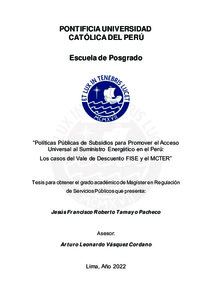| dc.contributor.advisor | Vásquez Cordano, Arturo Leonardo | |
| dc.contributor.author | Tamayo Pacheco, Jesus Francisco Roberto | |
| dc.date.accessioned | 2023-02-03T21:43:19Z | |
| dc.date.available | 2023-02-03T21:43:19Z | |
| dc.date.created | 2022 | |
| dc.date.issued | 2023-02-03 | |
| dc.identifier.uri | http://hdl.handle.net/20.500.12404/24205 | |
| dc.description.abstract | En la presente investigación se evalúa la conveniencia de los mecanismos de subsidios energéticos
aplicados por el Estado peruano. En específico, se analizan dos ellos: el “Vale de Descuento
FISE” y el “Mecanismo de Compensación de la Tarifa Eléctrica Residencial” (MCTER). El
objetivo general de la investigación es examinar la eficacia de estos dos mecanismos de política
de subsidios a la energía vigentes, por medio de la evaluación del cumplimiento de los objetivos
de acceso universal a la energía y de inclusión energética. Este análisis se contextualiza en el
marco de la Política Energética Nacional 2010-2040, en la que el Perú se ha dispuesto como meta
alcanzar un alto grado de acceso y uso de la energía para toda su población. Se analizarán los dos
sistemas de subsidios antes mencionados desde el marco de las políticas de acceso universal a la
energía y desde el enfoque de la teoría de la regulación tarifaria de la energía. Para ello,se estudia
el mecanismo interno de cada subsidio y cómo ha sido implementado a lo largo de los años. Se
concluye que los dos subsidios estudiados del sector energético peruano no cumplen con los
objetivos de acceso universal a la energía y de inclusión energética. Ello, se debe básicamente a
que no alcanzan a ser óptimamente eficaces en su estructura y en su aplicación (entendiéndose
como eficacia al cumplimiento de los objetivos de acceso universal a la energía).
Se menciona, también, que la eficacia y equidad de estos subsidios puede ser mejorada con una
adecuada reestructuración en su diseño. Asimismo, se han identificado políticas regulatorias
alternativas de mejoras que podrían permitir acortar la brecha de acceso universal tanto al GLP
como a la electricidad. Estas conllevarían a que haya una mejora en la eficacia y equidad de este
tipo de medidas, como los subsidios energéticos, respecto al cumplimiento de objetivos de
inclusión y acceso universal a la energía. | es_ES |
| dc.description.abstract | This research evaluates the convenience of the energy subsidy mechanisms applied by the
Peruvian State. Specifically, two of them are analyzed: the "FISE Discount Voucher" and the
"Residential Electricity Tariff Compensation Mechanism" (MCTER). The general objective of
the research is to determine the effectiveness of these two current energy subsidy policy
mechanisms, by evaluating whether these two subsidy schemes comply with the objectives of
universal energy access and energy inclusion. This analysis is contextualized in the framework of
the National Energy Policy 2010-2040, in which Peru has set as a goal to achieve a high degree
of energy access and use for its entire population. The two aforementioned subsidy schemes will
be analyzed from both the framework of universal energy access policies and from the approach
of the theory of energy tariff regulation. For this purpose, the internal mechanism of each subsidy
is studied and how it has been implemented over the years. It is concluded that the two subsidies
aforementioned in the Peruvian energy sector do not meet the objectives of universal access to
energy and energy inclusion. This is basically because they are not optimally effectiveness in their
structure and application (efficacy being understood as the fulfillment of the objectives of
universal access to energy)
It is also concluded that the effectiveness and fairness of these subsidies can be improved with an
adequate restructuring of their design. In addition, alternative regulatory policies for
improvements have been identified that could help to reduce the gap in universal access to both
LPG and electricity. These would lead to an improvement in the effectiveness and fairness of this
type of measures, such as energy subsidies, regarding the fulfillment of objectives of universal
energy access and energy inclusion. | es_ES |
| dc.language.iso | spa | es_ES |
| dc.publisher | Pontificia Universidad Católica del Perú | es_ES |
| dc.rights | info:eu-repo/semantics/openAccess | es_ES |
| dc.rights.uri | http://creativecommons.org/licenses/by-sa/2.5/pe/ | * |
| dc.subject | Subsidios--Perú | es_ES |
| dc.subject | Energía eléctrica--Perú | es_ES |
| dc.title | Políticas públicas de subsidios para promover el acceso universal al suministro energético en el Perú: Los casos del vale de descuento FISE y el MCTER | es_ES |
| dc.type | info:eu-repo/semantics/masterThesis | es_ES |
| thesis.degree.name | Magíster en Regulación de los Servicios Públicos | es_ES |
| thesis.degree.level | Maestría | es_ES |
| thesis.degree.grantor | Pontificia Universidad Católica del Perú. Escuela de Posgrado | es_ES |
| thesis.degree.discipline | Regulación de los Servicios Públicos | es_ES |
| renati.advisor.dni | 00056487 | |
| renati.advisor.orcid | https://orcid.org/0000-0002-4778-7512 | es_ES |
| renati.author.dni | 08202247 | |
| renati.discipline | 417697 | es_ES |
| renati.juror | Dammert Lira, Alfredo Juan Carlos | es_ES |
| renati.juror | Vasquez Cordano, Arturo Leonardo | es_ES |
| renati.juror | Garcia Carpio, Raul Lizardo | es_ES |
| renati.level | https://purl.org/pe-repo/renati/level#maestro | es_ES |
| renati.type | https://purl.org/pe-repo/renati/type#tesis | es_ES |
| dc.publisher.country | PE | es_ES |
| dc.subject.ocde | https://purl.org/pe-repo/ocde/ford#5.09.00 | es_ES |







